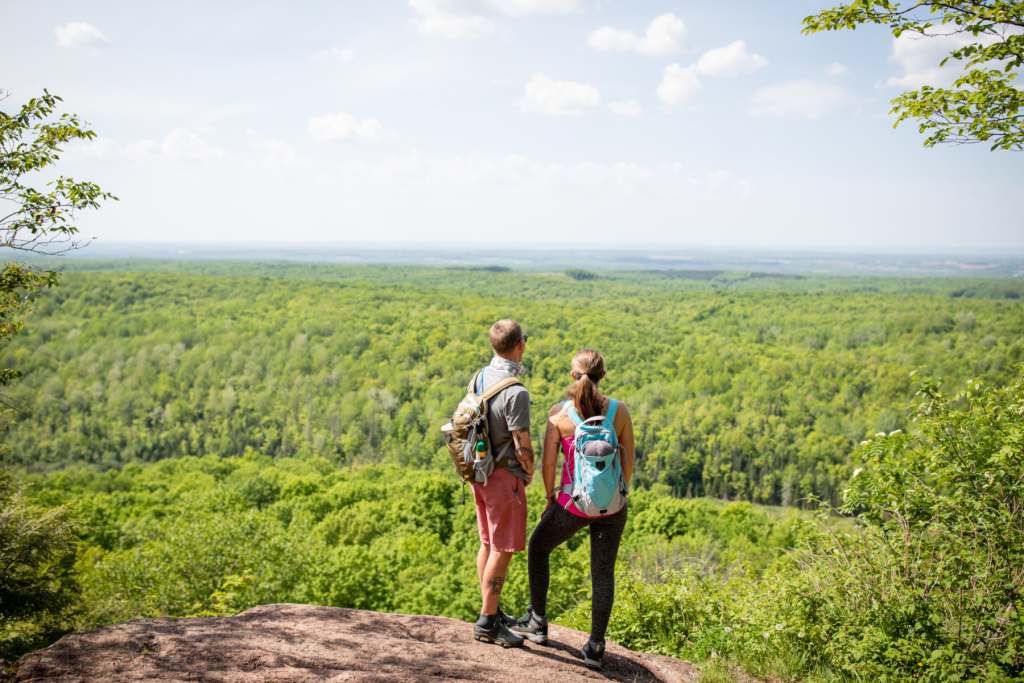As the focus on sustainable travel intensifies, Wisconsin, USA, is emerging as a beacon of eco-friendly tourism. Known for its pristine landscapes, rich cultural heritage, and innovative sustainability initiatives, the “Badger State” offers UK travellers an opportunity to explore in a way that aligns with their growing commitment to responsible travel.
Whether you’re looking for outdoor adventure, culinary delights, family fun or immersive cultural experiences, Wisconsin combines sustainability with authenticity, making it a must-visit destination.
A Natural Wonderland: Protecting Biodiversity
Wisconsin boasts an impressive array of natural attractions, from the sprawling Chequamegon-Nicolet National Forest to the serene Apostle Islands National Lakeshore. The Chequamegon-Nicolet National Forest overs more than 1.5 million acres of Wisconsin’s northwoods, managing lands for multiple uses including forestry, wildlife habitat, outdoor recreation, fisheries management, special forest products gathering, wilderness and natural areas management.
The Apostle Islands, for instance, are celebrated for their crystal-clear waters, red sandstone sea caves, historic lighthouses and shipwrecks. These islands have been designated as a National Lakeshore, ensuring the protection of their unique ecosystems. With 21 stunning islands and 12 miles of pristine mainland coastline, the park offers a treasure trove of outdoor adventures and natural wonders.
Visitors can kayak through the caves, hike on sustainable trails, camp on most of the islands and participate in guided tours that emphasise environmental education.
Wisconsin state parks, forests and trails have special rules to protect the safety of visitors and the environment. The state’s commitment to preserving its natural heritage is evident through robust conservation efforts and a strong emphasis on ecotourism.
Sustainable Agritourism: From Farm to Table
Wisconsin is often referred to as “America’s Dairyland,” but its agricultural heritage means that the state’s eateries value sustainably sourced ingredients even beyond their iconic cheese. Restaurants across the state champion the farm-to-table movement, procuring ingredients locally and seasonally. For example, Milwaukee, Wisconsin’s largest city, is home to numerous eateries and breweries committed to using organic produce, reducing food waste, and minimising their carbon footprint.
Outdoor Adventures with a Green Focus
For visitors looking to enjoy the great outdoors sustainably, Wisconsin offers a wealth of activities that have minimal environmental impact. Cycling enthusiasts can explore over 1,700 miles of bike trails, including the Elroy-Sparta State Trail, the first rail-to-trail conversion in the US. This railway-turned-multi-use trail provides 32 miles of hiking and biking adventure through forest, prairie, idyllic towns and even tunnels carved through rock. These paths not only provide breathtaking views but also contribute to eco-tourism by encouraging car-free exploration. Wisconsin is the home, and headquarters, of the world-famous Trek bicycle company.
For water lovers, Wisconsin’s many lakes and rivers are perfect for kayaking, paddleboarding, and canoeing. Visitors are encouraged to adopt the Leave No Trace principles to protect aquatic ecosystems.
Winter brings its own set of eco-friendly adventures, from cross-country skiing to snowshoeing in the state’s abundant snow-covered landscapes. Many resorts and lodges implement green initiatives, such as renewable energy usage and waste-reduction programmes.
Innovative Green Practices in Hospitality
From boutique hotels to larger resorts, Wisconsin’s hospitality sector is embracing sustainability. Many accommodations have adopted energy-efficient practices, such as using solar panels, installing water-saving fixtures, and sourcing materials locally for construction and decor.
Notable examples include the Aldo Leopold Legacy Center, an eco-friendly conference and visitor centre that boasts one of the greenest buildings in the United States. Named after the famed environmentalist and Wisconsin native Aldo Leopold, this venue embodies the state’s commitment to sustainability. The project is a master work in sustainable design and construction, earning the center the title of the world’s first carbon-neutral building and becoming the first building in Wisconsin to achieve LEED – Platinum status. And as a zero net energy building, the center produces more than 110% of its annual energy needs.
Another standout is The American Club Resort in Kohler, a five-star property with a deep commitment to green practices. As the first Forbes Five-Star and AAA Five-Diamond resort in Wisconsin, it sets the bar high for luxury eco-tourism by implementing water-recycling systems and sustainable landscaping techniques.
Only a mile from the downtown Bayfield, Wisconsin, and perfectly placed along the shoreline of Lake Superior, Wild Rice sits on the edge of slow-paced living, intentional innovation and natural beauty. Often called “The Gateway to The Apostle Islands,” this Midwestern locale continually finds its spark and imagination by simply letting nature take the lead.
Plan Your Sustainable Journey
As more travellers prioritise destinations that align with their environmental values, Wisconsin stands out as a leader in sustainable tourism. The state’s dedication to preserving its natural beauty, supporting local communities, and promoting eco-friendly habits ensures that visitors can enjoy meaningful experiences that are underpinned by sustainable practices. To book and plan a trip go to: https://www.discovernorthamerica.co.uk/
Things To Do in Wisconsin
For more information, go to www.travelwisconsin.com.
Main image: Chequamegon Nicolet National Forest and Delta Diner

